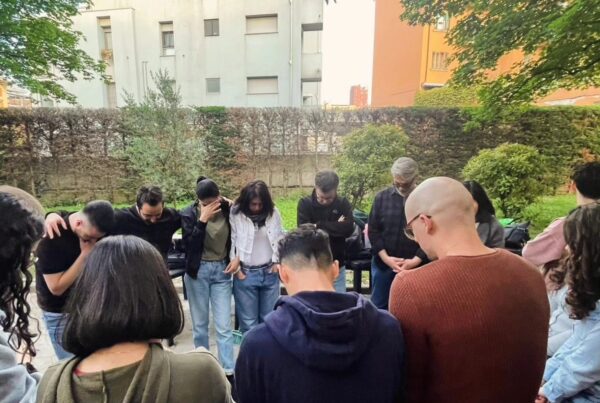Every church planter expects to begin from a place of lowliness. But rare is the church planter who makes peace with lowliness. I’m not talking about being anti-growth. I’m talking about being anti-entitled.
Naturally, we appreciate being appreciated. And we all want people to meet Jesus in our churches and see them grow accordingly. Yet along the way, it’s easy for those good desires of addition to our church and multiplication from our church to become diluted—ever so subtly—with thoughts like, I should be rewarded for this. I deserve more. When will I finally be recognized?
But when we read 1 Corinthians 4:9–13, Paul reminds us of the reality of our lowliness, along with our response to being treated as such in this life. “For I think God has displayed us, the apostles, in last place, like men condemned to die: We have become a spectacle to the world, both to angels and to people. We are fools for Christ, but you are wise in Christ! We are weak, but you are strong! You are distinguished, but we are dishonored! Up to the present hour we are both hungry and thirsty; we are poorly clothed, roughly treated, homeless; we labor, working with our own hands. When we are reviled, we bless; when we are persecuted, we endure it; when we are slandered, we respond graciously. Even now, we are like the scum of the earth, like everyone’s garbage.”
These aren’t nice words. They’re gritty and realistic. And before we mentally excuse ourselves from the conversation—since Paul is clearly describing apostles—let’s remember how he applies this reality in verse 16: “Therefore I urge you to imitate me.”
So here’s my plea: let’s be careful we don’t allow the sacred sacrifice of pastoral ministry to become a pathway out of “scumdom” into ‘“stardom.” How many more scandalous examples do we need before we learn Jesus wasn’t kidding when he said, “Everyone who exalts himself will be humbled, but the one who humbles himself will be exalted” (Luke 18:14)?
What if we became convinced that humility is the holy ground upon which we can encounter the God of power in a way that won’t destroy us but revive us?
Instead of fighting against lowliness, what if we made peace with it? What if we became convinced that humility is the holy ground upon which we can encounter the God of power in a way that won’t destroy us but revive us?
God’s Power in our Lowliness
The prophet Isaiah wrote that it’s in the low place that God meets us. “For thus says the One who is high and lifted up, who inhabits eternity, whose name is Holy: ‘I dwell in the high and holy place, and also with him who is of a contrite and lowly spirit, to revive the spirit of the lowly, and to revive the heart of the contrite’” (Isa. 57:15).
Only God can dwell up high in the place of limitlessness. When we try to go there—to the high and lofty place reserved for God alone—we’re treading upon the same destructive pathway through which the devil became the devil. But when we humble ourselves, when we embrace our God-ordained creatureliness, we discover the very place where God promises to revive his weary servants.
So let’s go there. Whether your church is 20 people in a living room or 20,000 in a multi-million-dollar facility, what would it look like for you to cultivate lowliness in the present season of your ministry?
Here are two regular practices that my flesh hates, but my soul loves because they help keep my heart low before the Lord.
1. Embrace Godly Limitations
When good parents place limitations on their children, it’s because they love them. And God is a very good Father. His limitations lead to life. As Zack Eswine reminds us, it was the rejection of God’s limitations that broke the world: “‘Unlimit me and my congregation for God’s glory in my generation!’ we might say. But when ‘unlimit me’ becomes our prayer, we are not the first to pray it. A desire like ‘unlimit me, now!’ ruined Eden in the first place and bid Jesus to come and die for us.”
So how can you willingly embrace good limits right now? Perhaps it’s learning to say “no” to good ideas or enticing opportunities that aren’t vital to your present season. Perhaps it’s cultivating real plurality in your leadership structure where it’s entirely possible you won’t get what you want, and you embrace that as a good thing for your soul. Or maybe it’s as simple as ensuring you regularly Sabbath—when you stop producing and achieving and practice cheerful gratitude for what you already have.
Pastor, let’s make peace with lowliness. Because that’s where Jesus is. It’s even who he is. And he bids us to meet him in that place, every single day.
Pastor, both your joy and longevity have been woven into rhythms where your actions loudly declare, “I am not God.” Consider what other ways will intentionally place the kind of limits on your life that will keep you grounded for the long haul of ministry. Whatever they are, embrace them.
2. Pursue Honest Friendships
It’s a wonderful thing to have a good laugh or conversation with a friendly acquaintance. But it’s a vital thing to have a few friends we can be dead honest with. Every pastor (and pastor’s wife!) needs one or two friends who humanize them. A friend they’re convinced loves them genuinely, in Dan White Jr.’s words, “as a relationship to consider and not a resource to consume.” A friend to whom they can confess, vent, and admit their worries—friends who know the real us.
None of us drift into these kinds of friendships; we pursue them like our ministries and lives depend on it. Because they do.
God’s Presence in our Lowliness
We don’t need to fear embracing limitations and walking in the light with a trusted friend or two. Those are just two rhythms of many that will help us cultivate an inward posture of lowliness to sustain us through troubles and ground us through successes.
Pastor, let’s make peace with lowliness. Because that’s where Jesus is. It’s even who he is. And he bids us to meet him in that place, every single day.
“Take my yoke upon you, and learn from me, for I am gentle and lowly in heart, and you will find rest for your souls. For my yoke is easy, and my burden is light” (Matt. 11:29–30).










